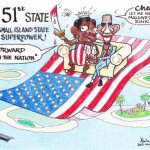In conjunction with World Press Freedom Day, the Human Rights Commission of the Maldives (HRCM) has called on the state to ease journalists’ access to information.
Journalists have rated difficulty in access to information as the second biggest obstacle to media freedom in the Maldives, according to a recently published report by the Maldives Broadcasting Commission (MBC).
The HRCM today called on the state to implement January’s landmark Right to Information (RTI) Act. The RTI act (Dhivehi) aims to widen and improve the scope for the citizen’s rights to information in order to increase transparency and accountability.
Noting increased threats to press freedom, the HRCM said: “[Reporters must] be able to work with independence, without intimidation or threat to bring stakeholder attention to social issues.”
In addition, the HRCM also called on all reporters to practice ethical journalism: “[M]edia reports must stay within social norms and respect everyone’s rights.”
The RTI act was ratified by President Abdulla Yameen earlier this year in January 2014, and must come into effect within six months of ratification.
At the time, the move was hailed by advocacy NGO Transparency Maldives as a “major step forward for good governance and transparency.”
Under the act, an appointed Commissioner has the power enforce a fine on information officers who deliberately refuse access to information. Such a fine may not exceed MVR5000 (US$324).
The Commissioner may also fine any individual who destroys requested information, obstructs a public authority or the Information Officer’s from providing access to information. Such a fine may not exceed MVR25,000 (US$ 1621).
The act also provides protection to whistleblowers if the whistleblower publicises information regarding corruption or breach of the law.
Despite positive steps forward, in February 2014, the Maldives dropped to 108th place in the Reporters Without Borders (RSF) Press Freedom Index for 2014, marking a decline in press freedom for the third consecutive year.
The MBC’s “Threat Analysis Report,” found that 84 percent of journalists surveyed reported being threatened at least once, while five percent reported being threatened on a daily basis.
Journalists identified political parties to be the top source of threat. Gangs, religious extremists and parliament placed second while the government was rated third.
Previous attacks on the press that illustrate these findings include prominent Maldivian blogger and journalist Ismail ‘Hilath’ Rasheed, who survived a murder attempt earlier in June 2012, suffering stab wounds to the neck.
Furthermore, opposition aligned broadcaster Raajje TV reporter Ibrahim ‘Asward’ Waheed nearly beaten to death in February 2013, whilst the station’s offices and equipment were destroyed in an arson attack in October.





